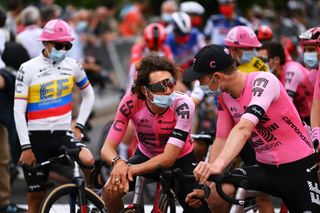Face masks to return at Tour de France to limit COVID-19 cases in the peloton
“We have to remain vigilant, I prefer that to missing the Tour de France” says Alaphilippe

The Tour de France organisers have drawn up a new COVID-19 protocol for this year's race to try to limit the risk of infection inside the peloton, with riders, team staff and officials set to wearing face masks at sign-on and in the team paddock, while riders will be banned from signing autographs.
The Reuters news agency first revealed the new COVID-19 protocol, while similar, more stringent rules were introduced for stage 1 of the Criterium du Dauphine race on Sunday.
Cyclingnews, like other media and officials, were informed that face masks were obligatory at the stage start and finish of the race. Tour de France organiser ASO told Cyclingnews that they have to still to release any information regarding a Tour de France COVID-19 protocol but all ASO staff wore face masks at the Criterium du Dauphine.
Races and teams are obliged to follow the limited UCI COVID-19 protocol that was drawn up in January when COVID-19 cases were falling. However, a number of cases at the recent Giro d’Italia, including Remco Evenepoel testing positive for COVID-19 while leading the race, appear to have set alarm bells ringing amongst race organisers and teams.
Riders and staff members were allowed out of their hotels last year and access to the team paddock at the start of the stages was open to media and thousands of VIP guests until midway through the 2022 race, when organisers decided to protect the riders to "fight against the spread of COVID-19."
According to Reuters, access to the team paddock will be allowed when the Tour starts in Bilbao on June 29, but everyone is required to wear a face mask and follow other COVID-19 rules.
"Do not get too close to the spectators - Social distancing, no selfies, no autographs,” a document seen by Reuters, said.
"For all the team members: Respect a confinement - Limit the interactions outside the race bubble. No eating out. Respect social distancing at the hotel."
While there are few COVID-19 obligations in force across Europe, riders and teams have started to be more cautious after the Giro d’Italia cases. Riders and officials wore face masks at the start of the opening stage of the Dauphiné.
"I don't mind, as long as we protect our health," Groupama-FDJ leader David Gaudu said. "I'd rather wear a face mask than have everyone panic again due to the epidemic and see riders are out of action due to COVID-19."
Julian Alaphilippe (Soudal-QuickStep) is also in favour of the protocol. He revealed to l’Equipe that he was the only person wearing a face mask on his flight to central France for the Criterium du Dauphine.
"I'm still being careful: it may be too much but we have to remain vigilant, I prefer that to missing the Tour de France,” Alaphilippe told the French sports newspaper.
"Cycling remains the only sport where you have a lot of controls: it spoils the party a bit, but we have to get used to it. In order not to stay at home in July and throw away all the sacrifices we’ve made, we must continue to stay in a bubble.”
"Maybe the measures are too heavy, but I really want to ride the Tour."

Thank you for reading 5 articles in the past 30 days*
Join now for unlimited access
Enjoy your first month for just £1 / $1 / €1
*Read any 5 articles for free in each 30-day period, this automatically resets
After your trial you will be billed £4.99 $7.99 €5.99 per month, cancel anytime. Or sign up for one year for just £49 $79 €59

Join now for unlimited access
Try your first month for just £1 / $1 / €1
Get The Leadout Newsletter
The latest race content, interviews, features, reviews and expert buying guides, direct to your inbox!

Stephen is the most experienced member of the Cyclingnews team, having reported on professional cycling since 1994. He has been Head of News at Cyclingnews since 2022, before which he held the position of European editor since 2012 and previously worked for Reuters, Shift Active Media, and CyclingWeekly, among other publications.